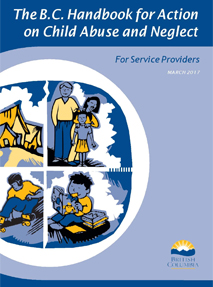Reporting child abuse in B.C. – 1-800-663-9122
If you think a child or youth under 19 years of age is being abused or neglected, you have the legal duty to report your concern to a child protection worker. Phone 1-800-663-9122 at any time of the day or night.
If a child or youth is in immediate danger, call police (call 9-1-1 or your local police) to intervene and then call a child protection worker.
Your call will be answered by Provincial Centralized Screening (PCS) . Their primary role is to receive and assess child protection reports and requests for support services across the province, 24 hours a day, 365 days a year.
Duty to report abuse or suspected abuse
The Child, Family and Community Service Act (CFCSA) requires that anyone who has reason to believe that a child or youth has been or is likely to be abused or neglected, and that the parent is unwilling or unable to protect the child or youth, must report the suspected abuse or neglect to a child welfare worker.
- The Duty to Report Pamphlet and Poster provide information on reporting concerns about children and youth.
- Learn more in the Child Abuse Prevention Handbook, which has been revised to clarify reporting requirements regarding children and youth living in situations where domestic violence exists.
What to report
When making a report to a child protection worker, it is helpful to include your name, your phone number and your relationship to the child or youth. But you can make an anonymous call if you prefer. The child protection worker will ask:
- The child’s or youth’s name and location;
- Whether there are any immediate concerns about the child’s or youth’s safety;
- Why you believe the child or youth is at risk;
- Any statements or disclosures made by the child or youth;
- The child’s or youth’s age and vulnerability;
- Information about the family, parents and alleged offender;
- Information about siblings or other children or youth who may be at risk;
- Whether you know of any previous incidents involving, or concerns about the child or youth;
- Information about other persons or agencies closely involved with the child, youth and/or family;
- Information about other persons who may be witnesses or may have information about the child or youth;
- Information about the nature of the child’s or youth’s disabilities, his or her mode of communication, and the name of a key support person; and
- Any other relevant information concerning the child, youth and/or family, such as language or culture.
You do not need all this information to make a report. Just tell the child protection worker what you do know. Time is of the essence in responding, so if you have concerns, do not delay.
After you report
Reports of suspected child abuse and neglect are assessed on a case-by-case basis and, depending on the circumstances. The report will result in different types of responses. Child protection workers choose the response that is least disruptive to the child or youth, and will keep the child or youth safe.
After the assessment process is complete, the child protection worker may:
- Provide ongoing child protection services;
- Offer the family support services;
- Refer the child, youth and/or family to a community agency; or
- Take no further action, if no further action is needed.
Helpline for Children
As a Service Provider, you have a key role to play in helping to keep children and youth safe, and this Handbook can help.
We must all work together and, if we suspect that child abuse or neglect is taking place, we must report it to a child welfare worker.

